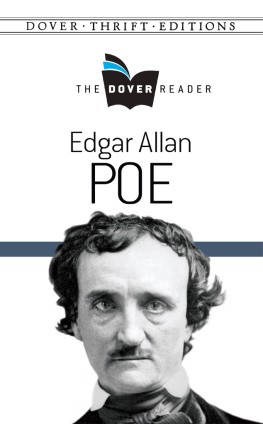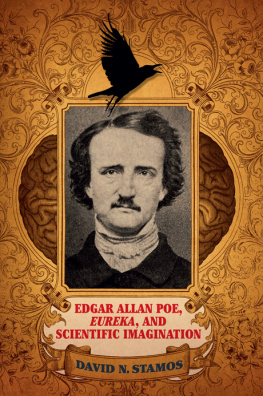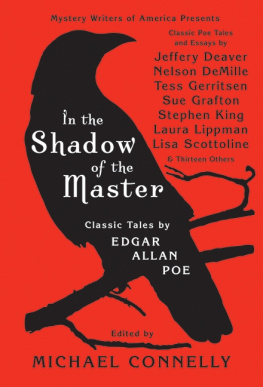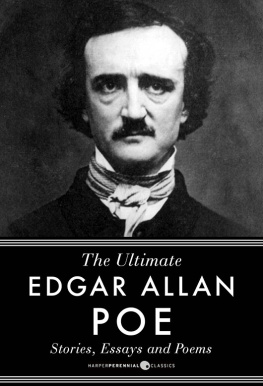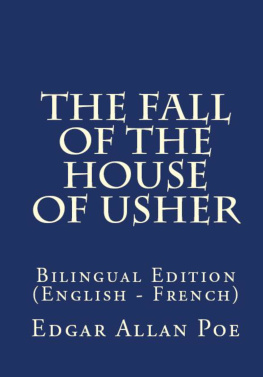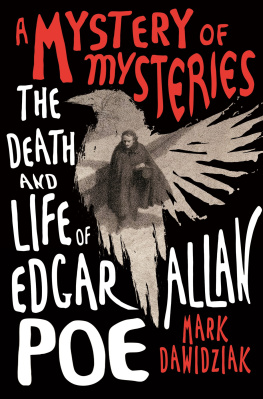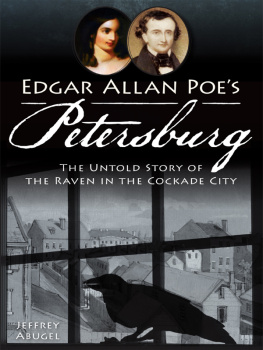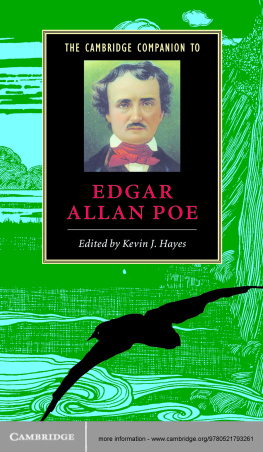
Edgar Allan Poe

DOVER PUBLICATIONS, INC.
Mineola, New York
DOVER THRIFT EDITIONS
G ENERAL E DITOR : M ARY C AROLYN W ALDREP
E DITOR OF , T HIS . V OLUME : J ANET B. K OPITO
Copyright
Copyright 2014 by Dover Publications, Inc.
All rights reserved.
Bibliographical Note
Edgar Allan Poe: The Dover Reader, first published by Dover Publications, Inc., in 2014, is a new compilation of short fiction, nonfiction, and poems reprinted from standard editions.
Library of Congress Cataloging-in-Publication Data
Poe, Edgar Allan, 18091849.
[Works. Selections]
Edgar Allan Poe : the Dover reader/Edgar Allan Poe.
p. cm. (Dover thrift editions)
eISBN-13: 978-0-486-80073-8
I. Title.
PS2602 2014
818'.309dc23
2014033862
Manufactured in the United States by Courier Corporation
79119X01 2014
www.doverpublications.com
Note
B ORN IN B OSTON on January 19, 1809, Edgar Poe was orphaned as a young child and sent to Virginia to live with the Allan family, whose fortune had been made in the tobacco industry. Rather than following in John Allans footsteps, Edgar chose to devote himself to writing. Living in poverty, owing in part to a lack of funds from John Allan, Edgar did well at the University of Virginia but fell deeply into debt. He published, anonymously, his first book, Tamerlane and Other Poems, in 1827, the same year that he enlisted in the U. S. Army. His second books of poems, Al Aaraaf, Tamerlane, and Minor Poems, appeared in 1829. After an early discharge from the army, he was accepted to the United States Military Academy at West Point. His third collection, Poems, was published in 1831.
Impoverished, Poe traveled to Baltimore, where he had paternal relatives. Turning from poetry to short fiction, Poe entered and won a short story contest, and his writing moved in that direction. This led to his taking a position in 1835 as an editor at the Southern Literary Messenger magazine, where he proved to be well suited to a literary profession. The Messenger thrived, with Poe providing both book reviews and stories. His outspoken reviews became a hindrance to his career, however, and he moved on, first to New York City and then to Philadelphia. Still struggling financially, Poe became a supporter of better financial rewards for professional writers, along with improvements to international copyright law.
In 1835, seeking to leave West Point, Poe disobeyed orders so that he would be court-martialed. Soon after, he married his cousin, Virginia Clemm, who was thirteen. In 1842, Virginia fell ill, and her health declined over the years. She died of tuberculosis in 1847. Her death sent Poe into depression and alcoholism. In the 1830s and 40s, Poe published his short stories in the Philadelphia Saturday Courier, Burtons Gentlemans and Grahams magazines, and Godeys Ladys Book, among others. His collection Tales of the Grotesque and Arabesque came out in 1840, including some of his best-known tales, such as The Fall of the House of Usher, MS. Found in a Bottle, Ligeia, and King PestA Tale Containing an Allegory. Edgar Allan Poe died in Baltimore in 1949, at the age of forty. The cause of death is unknown.
This selection of fiction, poetry, and nonfiction from the writings of Edgar Allan Poe conveys the nineteenth-century American authors mastery of the genres of mystery, detection, and horror. Of particular note are three short stories featuring detective C. Auguste Dupin. Debuting in The Murders in the Rue Morgue, Dupin continues his investigations in The Mystery of Marie Rogetthe first detective story in which a murder case is solved purely by reasoning (using information obtained secondhand). The third Dupin story, The Purloined Letter, is regarded by some readers and critics as the best of the trio. Poes only novel, The Narrative of Arthur Gordon Pym, is also included in this anthology. The poems gathered here, including The Raven, Lenore, Annabel Lee, and The Bells, resonate with the themes of death, lost love (no doubt influenced by the loss of his beloved Virginia), and dreams. The three nonfiction pieces, Maelzels Chess Player, A Few Words on Secret Writing, and The Philosophy of Composition reveal Poes keen intellect and appreciation of puzzles. To the modern reader, Edgar Allan Poe offers a unique blend of psychological depth, macabre events, romantic agony, and tragic outcomes. His lasting appeal stems from his expert crafting of these compelling themes and literary elements in his suspenseful stories and soulful poetry.
Contents
Edgar Allan Poe
The Dover Reader

Fiction

MS. FOUND IN A BOTTLE
Qui na plus quun moment vivre
Na plus rien dissimuler.
QuinaultATYS
O F MY COUNTRY and of my family I have little to say. Ill usage and length of years have driven me from the one, and estranged me from the other. Hereditary wealth afforded me an education of no common order, and a contemplative turn of mind enabled me to methodise the stores which early study very diligently garnered up. Beyond all things, the works of the German moralists gave me great delight; not from any ill-advised admiration of their eloquent madness, but from the ease with which my habits of rigid thought enabled me to detect their falsities. I have often been reproached with the aridity of my genius; a deficiency of imagination has been imputed to me as a crime; and the Pyrrhonism of my opinions has at all times rendered me notorious. Indeed, a strong relish for physical philosophy has, I fear, tinctured my mind with a very common error of this ageI mean the habit of referring occurrences, even the least susceptible of such reference, to the principles of that science. Upon the whole, no person could be less liable than myself to be led away from the severe precincts of truth by the ignes fatui of superstition. I have thought proper to premise thus much, lest the incredible tale I have to tell should be considered rather the raving of a crude imagination, than the positive experience of a mind to which the reveries of fancy have been a dead letter and a nullity.
After many years spent in foreign travel, I sailed in the year 18, from the port of Batavia, in the rich and populous island of Java, on a voyage to the Archipelago of the Sunda islands. I went as passengerhaving no other inducement than a kind of nervous restlessness which haunted me as a fiend.
Our vessel was a beautiful ship of about four hundred tons, copperfastened, and built at Bombay of Malabar teak. She was freighted with cotton-wool and oil, from the Lachadive islands. We had also on board coir, jaggeree, ghee, cocoa-nuts, and a few cases of opium. The stowage was clumsily done, and the vessel consequently crank.
We got under way with a mere breath of wind, and for many days stood along the eastern coast of Java, without any other incident to beguile the monotony of our course than the occasional meeting with some of the small grabs of the Archipelago to which we were bound.
One evening, leaning over the taffrail, I observed a very singular, isolated cloud, to the N. W. It was remarkable, as well for its color, as from its being the first we had seen since our departure from Batavia. I watched it attentively until sunset, when it spread all at once to the eastward and westward, girting in the horizon with a narrow strip of vapor, and looking like a long line of low beach. My notice was soon afterwards attracted by the dusky-red appearance of the moon, and the peculiar character of the sea. The latter was undergoing a rapid change, and the water seemed more than usually transparent. Although I could distinctly see the bottom, yet, heaving the lead, I found the ship in fifteen fathoms. The air now became intolerably hot, and was loaded with spiral exhalations similar to those arising from heated iron. As night came on, every breath of wind died away, and a more entire calm it is impossible to conceive. The flame of a candle burned upon the poop without the least perceptible motion, and a long hair, held between the finger and thumb, hung without the possibility of detecting a vibration. However, as the captain said he could perceive no indication of danger, and as we were drifting in bodily to shore, he ordered the sails to be furled, and the anchor let go. No watch was set, and the crew, consisting principally of Malays, stretched themselves deliberately upon deck. I went belownot without a full presentiment of evil. Indeed, every appearance warranted me in apprehending a Simoon. I told the captain my fears; but he paid no attention to what I said, and left me without deigning to give a reply. My uneasiness, however, prevented me from sleeping, and about midnight I went upon deck.As I placed my foot upon the upper step of the companion-ladder, I was startled by a loud, humming noise, like that occasioned by the rapid revolution of a mill-wheel, and before I could ascertain its meaning, I found the ship quivering to its centre. In the next instant, a wilderness of foam hurled us upon our beam-ends, and rushing over us fore and aft, swept the entire decks from stem to stern.
Next page
